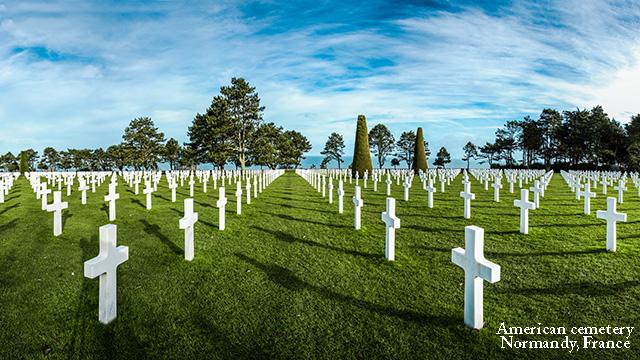Dear Friends,
Our country celebrates Memorial Day this weekend and it always brings back to me memories of visits to cemeteries filled with fallen soldiers. I have visited Arlington Cemetery several times and watched the changing of the guard at the Tomb of the Unknown Soldier. Nearly 400,000 people are buried in its 639 acres. Arlington is a massive monument to those who dedicated their lives in service to our country.
I spent hours walking the beaches of Normandy and examined headstones at the American Cemetery in France. The cemetery site covers 172 acres and contains the graves of 9,386 of our military dead, most of whom lost their lives in the D-Day landings and ensuing operations. I kept looking for fellow Nebraskans who were buried there. The Memorial structure at the American Cemetery was a bigger version of the structure I had seen so often at Memorial Park in Omaha. The curved wall with columns and openings have an iconic look that we now associate with honoring those who have died.
I have not read it, but Drew Gilpin Faust’s book, This Republic of Suffering, details the changes in attitudes and practices towards death that took place in the United States during and after the Civil War. The sheer numbers of those killed in a single battle required burying the bodies where they fell rather than sending them home to rest in churchyards and family plots – the norm up until that time. This gave way to the creation of national cemeteries and the accompanying memorials to pay tribute to those who died while serving their country.
One of the things that strikes me at these iconic cemeteries is the way these sites were transformed from battlegrounds to parks. They seemed to represent the peace that comes only with time. The quiet that fills the American Cemetery in Normandy is deep and profound.
Memorial Day is an opportunity for our country to honor the great sacrifices of those who died in battle. It can also be a call to restore hope and a focus for the future in the midst of our most dire circumstances.
Isaiah, the prophet who proclaims a future when swords and spears would be turned into plowshares and pruning hooks, recognizes the fragile reality of life and the enduring presence and power of God: Then the glory of the Lord shall be revealed, and all flesh shall see it together; for the mouth of the Lord has spoken. A voice says, “Proclaim!” I answer, “What shall I proclaim?” “All flesh is grass, and all their loyalty like the flower of the field. The grass withers, the flower wilts, when the breath of the Lord blows upon it.” “Yes, the people are grass! The grass withers, the flower wilts, but the word of our God stands forever.” Go up onto a high mountain, Zion, herald of good news! Cry out at the top of your voice, Jerusalem, herald of good news! Cry out, do not fear! Say to the cities of Judah: Here is your God! Here comes with power the Lord God, who rules by his strong arm; Here is his reward with him, his recompense before him. Like a shepherd he feeds his flock; in his arms he gathers the lambs, carrying them in his bosom, leading the ewes with care.
As our country remembers our fallen soldiers, may we also cling to the dream of a day when it will no longer be necessary to build memorials to those killed in battle as peace flowers among all humankind. May we strive to work for peace among all peoples. May we no longer glory in military power but glory in the peace that exists between nations and peoples. May God’s dream for humankind become a reality in our generation.
Peace,
Fr. Damian



